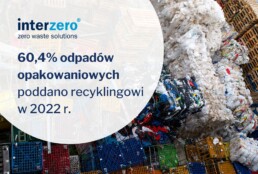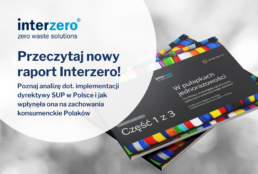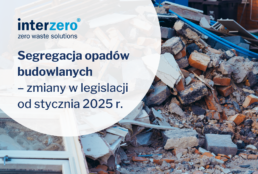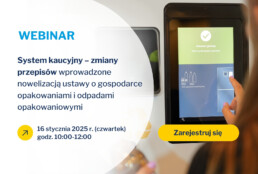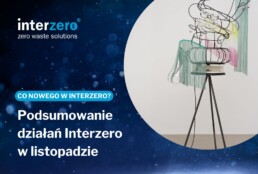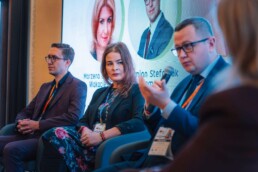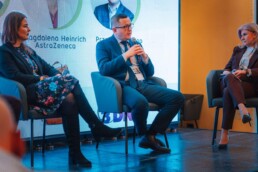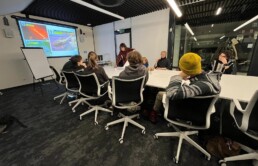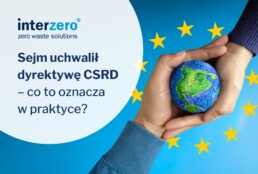Merry Christmas and a Happy New Year!
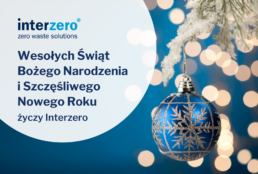
Christmas greetings
On the occasion of the forthcoming Christmas holidays, we wish you prosperity, a unique atmosphere, warmth and an abundance of all goods.
May the joy and peace of Christmas and a sense of personal and professional fulfilment accompany you throughout the New Year.
Wishes Interzero Group in Poland
Interzero offices open until 12:00 on 24 December
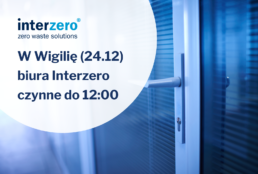
Shortened working day on Christmas Eve
Dear Sirs
We would like to inform you that on 24.12.2024 the offices of Interzero (Warsaw, Lodz, Krakow) will be open until 12 noon.
On New Year's Eve, we work regular hours.
The Interzero team
Independent movers did not meet annual packaging waste recycling targets in 2022.
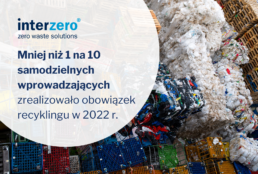
Independent movers did not meet annual packaging waste recycling targets in 2022.
Only 8% of independent introducers achieved the minimum statutory recycling levels in 2022 - according to the IOŚ-PIB report Packaging and packaging waste management in Poland in 2022. In the same period, recovery organisations achieved or even exceeded the annual recycling levels for all types of packaging waste.
Only 8% of independent introducers fulfilled the recycling obligation
Among the introducers who chose to independently ensure the recycling of packaging waste they generated, as many as 11,234 entities were required to achieve the required recycling levels , which in 2022 were:
- 30% for plastic waste,
- 51% for aluminium waste,
- 55% for ferrous metal waste,
- 66% for paper and cardboard waste,
- 62% for glass waste,
- 19% for wood waste,
- 59% for all above types of packaging waste combined.
Based on data from the BDO register, EIA-PIB experts calculated that only 8% of independent introducers achieved the minimum levels mentioned . The percentage of independent introducers who managed to meet the statutory minimum is shown in the graph below:
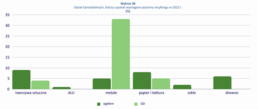
Source: Report on Packaging and Packaging Waste Management in Poland in 2022
At the opposite pole are recovery organisations that in 2022 achieved the statutory recycling levels for packaging waste made of metal, glass, paper and cardboard and exceeded the required recovery level for plastic packaging waste [and] .
Cooperation with a recovery organization is a chance to fulfill the obligation and avoid the product fee
Failure by the entrepreneur to achieve the statutory levels of packaging waste recycling results in the necessity to calculate and pay a product fee, which is a kind of environmental tax. In order to avoid the obligation to pay the fee, the entrepreneur can transfer to the recovery organisation its obligation to recycle packaging waste generated from the packaging and products in packaging introduced by it. Thanks to this, the introducer pays only a fixed, low amount under the contract with the recovery organization and does not have to bother with ensuring waste recycling.
Pass on your recycling responsibility to the Interzero Recovery Organisation
Interzero takes over recycling obligations from entrepreneurs in the scope of:
- packaging waste,
- batteries and accumulators,
- post-consumer products: tires, oils and lubricants,
- electrical and electronic equipment.
Thanks to this, every entrepreneur can comprehensively transfer to us all of their obligations resulting from introducing packaging and products to the market. Check what obligations your company is subject to!
By signing one contract you will gain certainty that your company will meet its obligations to ensure statutory levels of recovery, recycling and preparation for reuse.
[1] Packaging and packaging waste management in Poland in 2022, https://ios.edu.pl/wp-content/uploads/2024/09/gospodarka-opakowaniami-i-odpadami-opakowaniowymi-w-polsce-w-2022-r-2.pdf
Where to return food after the holidays? Christmas zero waste solutions
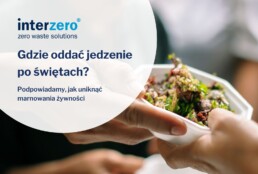
Where to return food after the holidays? Christmas zero waste solutions
Holidays, holidays and after the holidays, and the fridge is still full? Excess food: bought, prepared and then thrown away is almost a permanent element of every celebration and family gathering. Where to give away food after the holidays so that wasting it does not become a new, not very ecological tradition?
How not to waste food? Learn about food sharing
Every year in Poland, around 4.5 million tons of food is wasted, and 60% of that in households. Why? The most common reasons for throwing away food, as declared by respondents, are:
- expiry date - 60%,
- too much shopping - 26%,
- improper storage - 26%,
- purchase of unpalatable products - 25%,
- purchase of poor quality products - 17%,
- too large portions of meals - 18%,
- lack of ideas on how to use the products - 10% [i] .
The amount of food thrown away increases dramatically during the Christmas and New Year period . It is estimated that 83% of people throw away food during this time. December 24 has even been unofficially declared Christmas Food Waste Day - in Poland alone, as much as 9.2 thousand tons of food end up in the bins. [ii].! Can this be remedied?
For environmental reasons, we encourage moderation above all, which is one of the most important ingredients in our recipe for holiday peace . However, we assume that since you have arrived here, you are struggling with the problem of managing food after the holidays and are looking for a solution that is best for you and nature.
The remedy to most of these problems is food sharing . This movement encourages people to give away excess food to people who will gladly accept it and literally save it from going to waste . There is only one condition - the food must still be edible.
Where to drop off food after the holidays? Map of food pantries in Warsaw and throughout Poland
One way to do holiday food sharing is to use canteens, also known as community fridges. Canteens are publicly accessible fridges, cabinets, and sometimes small rooms that allow for the exchange of food . You can not only leave fresh products or dishes there, but also take what others have left on the shelves.
What should be donated to the soup kitchen? Only food that we would eat ourselves. Importantly, it may be past its expiration date - dry and loose products, preserves, spices, and sometimes even properly stored dairy products are often good for consumption after the date indicated on the packaging. However, when giving food to a canteen, it is worth following a few rules :
- products should be placed in clean packaging and tightly closed,
- Homemade dishes should be labelled with their ingredients and preparation date,
- you can leave previously opened products, but you should indicate the date of opening (especially in the case of food that spoils quickly),
- If a dish requires storage at a low temperature, it should definitely be placed in the fridge!
Contrary to appearances, eateries are not the domain of big cities - you can find them in small towns too!
See the nationwide map of canteens
Go to the map of Warsaw's food places
Don't see your location here? Try searching for it, for example, in an internet search engine - the network of eateries is constantly growing, so there may be locations in your area that have not yet been marked on the map.
List of places where you can donate food after holidays, events and every day
Food drives are not the only places where you can donate food after the holidays (and not only after the holidays). See where else you can share food!
- Food Banks
These are charitable institutions that accept any type of food and then distribute it to those in need. All food products (including perishable products, such as bread, dairy, meat, fruit and vegetables) can be donated to such a bank at least 2 days before their expiration date. There are 31 such banks in Poland. See the map of Food Banks .
- Facebook groups and local forums
Food sharing is also possible through social media and local groups, which you can find under the names:
- online food hall, foodsharing, freeganism,
- I will give it back, watch out, the garbage truck is coming (or simply: the garbage truck),
- we don't waste food.
- Caritas Poland Branches
Caritas has long been actively working to help those in need, while also preventing food waste. Local Caritas branches often accept unnecessary food that has been sitting in the fridge, for example after the holidays or an event. It is worth contacting the nearest Caritas branch and donating food to them, which will then be given to those in need.
- Facilities for people in homelessness crisis
Surplus food from the holidays is also readily accepted by shelters and shelters for people in homelessness crisis. A list of all such facilities, divided by province, can be found on the website of the Ministry of Family, Labor and Social Policy .
And when you do have to throw away... How not to waste food that ends up in the trash?
Sometimes food has to be thrown away - it is spoiled, over-salted, burnt, there may be many reasons. However, it is worth doing it wisely. Properly sorted waste from the table, fridge or kitchen cupboard can still be recycled organically, i.e. composted or fermented.
Where to throw away food? Most food goes into the brown bin for bio-waste . This is where unnecessary, spoiled or expired food should go, but with some exceptions. Leftover meat, cold cuts and bones are mixed waste as are eggs, cheese and other animal products. Mixed dishes containing animal products, such as salads or sauces, are not bio-waste either. Check what we throw away and what we do not throw away into bio-waste .
An alternative to a bio-waste bag is a composter: home, kitchen or electric. It allows you to turn bio-waste into a natural and completely free fertilizer for plants, which can be created in just 24 hours! Such possibilities are provided by the Oklin composter from the Smart line .
[i] Zero recycling point in Poland , https://portalkomunalny.pl/wp-content/uploads/2024/12/raport-punkt-zero-recyklingu-w-polsce.pdf
[ii]. Holidays, holidays and... to the trash. We throw away 1.6 kg of holiday food per person , https://www.rp.pl/przemysl-spozywczy/art41538111-swieta-swieta-i-do-kosza-wyrzutmy-1-6-kg-swiateczny-jeczenia-na-osobe
Together we do good, that is Noble Parcel 2024 at Interzero
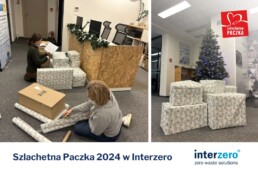
Together we do good, that is Noble Parcel 2024 at Interzero
Once again, employees of the Interzero Group in Poland got involved in the Noble Parcel project. Thanks to their donations, it was possible to purchase gifts and necessary items for a family in Krakow.
We would like to thank this year's coordinators - Alicja Kowalska, Edyta Mantorska, Joanna Nowak, Anita Janiec, Klaudia Szymańska and Monika Krysztofińska - for organising the collection and Jarosław Dymek, Katarzyna Kacprzak, Aleksandra Stolarczyk, Aleksandra Świątek, Paulina Dulak and Joanna Marek for wrapping the gifts. A big thank you also goes to all the Interzero employees for supporting the campaign. Thanks to you, the magic of Christmas will come to yet another house!
We strongly encourage everyone who was not able to take part in the Noble Parcel this year to support the organisation with donations here. Together we can make Christmas joyful for even more families!
The SUP Directive, or a half-whistle revolution
The SUP Directive, or a half-whistle revolution
Despite the fact that the provisions of the SUP Directive have been in place in Poland for more than a year and a half, the majority of Poles have not noticed any significant change in terms of packaging, plastic reduction or the availability of alternatives to disposables, according to the latest data presented in the first part of the 'In the Traps of Disposability' report, entitled 'The Curse of Single-Use Plastic', produced by Interzero.
The revolution has passed and hardly anyone has noticed - this is how, in a few soldierly words, one could summarise the effects of the so-called Single-Use Plastic Act (hereafter also: 'SUP Act' - from Single-Use Plastic) coming into force. Only 13 per cent of respondents, declared that they knew what the SUP Directive waswhat its objectives are, and what tools will be used to achieve them.
However, it is not the awareness of Poles per se that is the issue, but the low effectiveness of the mechanisms implemented in Poland that were supposed to encourage waste prevention and product reuse. One of these is the imposition of an additional charge on plastic packaging, in force since 1 January 2024, which was supposed to - like in the case of advertising bags, for which we have been paying for several years - encourage us to use reusable packaging for drinks and food.
The snag, That 42 per cent of respondents never even noticed these additional charges. In contrast, as much as 56 per cent systematically ignore them because they are usually low enough in relation to the amount on the receipt (on average a few tens of pennies, the most being around PLN 2 per item) that they do not encourage people to give up the convenience that the vast majority of respondents see in disposable packaging. "You don't have to wash them, return them to any point or return them to a restaurant, or carry them with you in case of spontaneous decisions to order a takeaway meal," respondents also pointed out during in-depth focus research conducted independently by Opinia24.
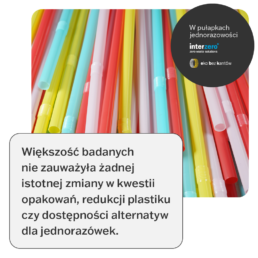
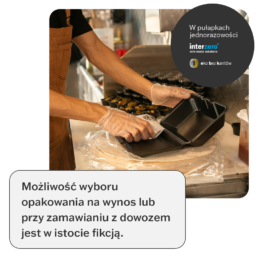
Multiple use - still little incentive
Unfortunately, it is also a fiction from the respondents' perspective to offer an alternative type of packaging in catering establishments. It appears that this obligation is implemented more in theory than in practice - the The vast majority of respondents (79 per cent) have never encountered the option of choosing different, more environmentally friendly packaging in a restaurant or when ordering takeaway. Only one in four consumers has ever encountered information about the legally guaranteed (just under the SUP Directive) reusable packaging alternative.
This was directly confirmed by the respondents themselves - "Only choice about cutlery, whether you want extra plastic. That's the only choice I have in the application. When I come and take away, nobody asks me either. Alternatively, whether to give a net or take in my hand," said one qualitative research participant.
- "Usually there is no such option, it is just one option available at a particular place. For example, the 'Chinese' has their containers, the pizzeria has their pizza boxes and no one asks if we want anything else. I have not encountered a choice," echoed the other.
- "[...] I will say frankly that since 1 July, I have ordered many times, more than 15 times or more, and no one either in the premises or on the phone has offered me anything like that," - indicated another respondent.
What does discarded packaging say about us?
In the first part of the report 'In the traps of reusability', entitled 'The curse of single-use plastic', we also read a lot about the eating habits of Poles: what they order most often, where and how they order (by phone, app, in person), what they pay attention to when they look at the packaging they are offered, and what they think about reusable packaging.
And these are just some of the findings from the qualitative and quantitative research to help diagnose and describe the state of implementation of the single-use plastics directive in Poland. The qualitative research involved interviews with 24 people, the quantitative CAWI research was conducted on a nationwide representative sample of 1,000 people. You can read the entire publication here: https://ekobezkantow.pl/raporty/w-pulapkach-jednorazowosci/
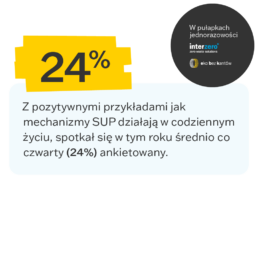
About Eco without the corners
In 'Eco without the squiggles', we talk about ecology without bending the truth. We deal with myths, fake news and half-truths. Our aim is to explain why waste should be separated, not just how to do it properly.
"Eco without a corner" was born out of the belief that in a world full of misinformation and greenwashing, a reliable source of accurate information is needed. We cover topics such as sustainability, recycling, GOZ and legislation related to waste management. We discuss the environmental impact of packaging, batteries and electro-waste, as well as how to reuse them as valuable resources.
Construction waste segregation - changes from January 2025
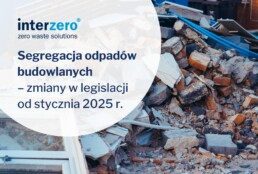
From January, changes in the way construction and demolition waste is segregated
From 2025 segregation of construction and demolition waste at the place of its generation will not be mandatory. The abolition of the obligation to segregate at source (which has not even entered into force yet) is provided for in the draft amendment to the Waste Act, which the Council of Ministers adopted during the session of 29 October 2024.
Abolition of the obligation to separate construction and demolition waste at source
The most important provisions of the amendment are the abolition of the obligation to segregate , i.e. selective collection of construction and demolition waste at the place of its generation, and the definition of responsibility for the segregation of waste fractions.
Every entrepreneur generating construction and demolition waste will be obliged to separate at least 6 fractions at the place of generation:
- wood waste,
- metal waste,
- glass waste,
- plastic waste,
- waste slice,
- mineral waste, including concrete, bricks, tiles, ceramics and stones.
The draft amendment to the Waste Act was created in response to interpretation doubts and potential problems with the organisation and costs of selective collection reported by representatives of the construction industry. The previous version of the regulations, which were to enter into force on January 1, 2025, did not clearly state who is responsible for selective collection and collection of construction and demolition waste. The need to sort them into 6 fractions at the place of generation would also cause a sharp increase in the costs of removing such waste, which in turn could contribute to their illegal storage and disposal directly into the environment .
The waste producer will be able to order segregation
According to the provisions of the act amending the act on waste, an entrepreneur generating construction and demolition waste will be able to transfer it to another authorized entity, which will take over the obligation to separate it into at least 6 fractions outside the place of generation. Importantly, transferring waste to another entity does not completely release the producer of construction and demolition waste from the responsibility for fulfilling the obligation to separate it. If this obligation is not fulfilled due to the fault of the entity that took over the waste, both entities (the producer and the recipient) will be jointly and severally liable for it.
The new regulations are to enter into force on 1 January 2025.
Handling construction and demolition waste according to the hierarchy
In the justification for the draft act, its authors stressed the need for entrepreneurs to comply with the so-called waste management hierarchy:
entities providing services in the field of construction, demolition, renovation of facilities (construction contractors) are obliged to prevent waste generation. [i]
First of all, it is necessary to take action to prevent the generation of construction and demolition waste. Selective waste collection should only take place when the materials are no longer suitable for reuse . The segregation itself is to ensure suitability for preparation for reuse, recycling and other recovery. Regardless of the place of sorting (at the place of generation or outside the place of generation), individual fractions of construction and demolition waste should then be transferred to specialist entities that will take care of their further management. For this purpose, it is often necessary to order professional collection of construction and demolition waste from a specified address offered by, among others, a waste collection company such as Interzero.
[i] https://orka.sejm.gov.pl/Druki10ka.nsf/0/A065E318FFC3BE21C1258BC70041F23F/%24File/766-uzasadzenie.docx
Participate in the training course "Deposit system - regulatory changes introduced by the amendment of the Packaging and Packaging Waste Management Act".
Amendment to the Packaging and Packaging Waste Management Act
The Packaging and Packaging Waste Management Act of 13 June 2013 introduced provisions for the inclusion of certain beverage packaging in a deposit scheme. The deposit systems were to be launched, in accordance with the provisions of this law, from January 2025. However, in order for them to function properly, a number of additional amendments to the Act proved necessary, in line with demands made, among others, by entrepreneurs introducing packaged beverages.
What will we talk about during the training?
The training will discuss the changes to the provisions of the Packaging and Packaging Waste Management Act of 13 June 2013 introduced by the Amendment Act passed in December 2024, including, among others, the postponement of the launch of deposit schemes and the consequences thereof, changes to the drinks covered by the deposit scheme, changes to the way deposits are collected, the inclusion of unclaimed deposits in VAT.
The exact scope of the topic:
- Clarification of the provisions for obtaining authorisations to set up bail schemes.
- Exclusion of milk and milk product packaging from deposit schemes.
- Making the collection of deposits mandatory at each stage of the sale of packaged beverages.
- Enabling so-called reverse logistics by vendors.
- Obligation for operators of commercial units with an area of 200 m2 or less to collect reusable glass packaging.
- Subject to VAT on the unclaimed deposit.
- Postponement of the launch of bail systems
The training will be led by: Pawel Sosnowski, Board Commissioner for Environmental Regulation at Interzero
Registration link HERE
Who should take part?
The webinar is primarily aimed at:
- Entrepreneurs introducing packaged beverages
- Environmental specialists
- Persons responsible for packaging waste management in retail chains
- Anyone interested in the latest legal regulations on packaging management
You are cordially invited to attend the webinar!
Registration for lasts until: 16 January 2025 by 8:00 am.
What happened in November? Read Interzero's summary of the last month
What happened in November? Read Interzero's summary of the last month
Speeches at industry events, training courses and campaigns and educational workshops - even though the end of the year is approaching and the holiday spirit is already in the air, we at Interzero are still going strong. We would like to invite you to read a summary of November in the Interzero Group in Poland, in which we briefly outline the most important events of the past month.
Interzero Environmental Sustainability Dashboard with international GRI Assurance certification
Environmental Sustainability Dashboard from Interzero is now licensed by the Global Reporting Initiative (GRI)! This is another step for us to make ESG reporting simple and accessible to every company. At the same time, we want our tool to be reliable. Through the GRI Licensing Software & Tools Program, GRI ensures that our Environmental Sustainability Dashboard accurately and efficiently addresses GRI standards, based on best practices. The key benefits of our programme are accurate sustainability reporting, helping you meet legislation and attracting stakeholders - through robust and transparent reporting. We are almost certain that even companies that will not be subject to ESG reporting will need to keep records if they want to work with larger entities.
Business and carbon neutrality - Interzero in external debates
This month Interzero had the pleasure of be a guest speaker at the ITTF Warsaw international trade fair, that is, at one of the largest events in the travel industry, where partners involved in the development and promotion of the sector come together. Our representative, Managing Director at Interzero Przemysław Kuna, took part in a panel entitled "The impact of supplier selection on the carbon neutrality of business travel. How sustainability policies affect business travel management'. Przemysław advocated that industry players who have not yet taken an interest in ESG should not be crossed out. The speakers talked not only about business travel, but also about fleet electrification and infrastructure in Poland.
In addition, Przemyslaw also took part in the debate Rzeczpospolitaej: "How to reconcile fire and water, i.e. the needs of business and cities vis-à-vis the ROP during the mobilisation of work on the law".held in the editorial office of the daily newspaper as part of the 'Fight for Climate' series. Our expert took a concrete stance - as Interzero, we are in favour of a free market and transparent extended producer responsibility model. Everyone wants to know what they are paying for and why. We do not want entrepreneurs to become mere objects on which further financial obligations can be imposed. We encourage you to read the article summarising the debate here.
On-the-job training - WIOŚ control no longer intimidating!
At the end of November, Łukasz Pachucki conducted a classroom training course at our headquarters in Łódź for the second time, this time under the title 'Environmental inspection control in a company'. We are very pleased that we were able to carry out this project in more intimate groups. The exchange of knowledge, experience and the opportunity to ask any questions to an expert allows for an in-depth study of the topic. The companies whose employees attended the training already know every step of the inspection, and thanks to the Q&A session and the opportunity to consult with our expert after the training, they have guidelines and plans in place to ensure that the inspection of the WIOŚ goes smoothly. We would like to thank the presenter for the substantive workshop and all the participants for their confidence - we hope to see you at future classroom trainings!
At the intersection of culture and sustainable development - workshops and campaigns
On the initiative of the Interzero Environmental Education Team, in cooperation with the Foundation Bęc Zmiana, a workshop entitled "Architecture of Waste" took place on 23 November in a Warsaw theatre.. Among the topics of the meeting were the new waste regulations. These are inextricably linked to the creation of appropriate urban, housing and communication spaces. Through the prism of their own experiences from many sectors, the participants generated ideas for new solutions which could, for example: help consumers to be active in the deposit system. Architects Michał Sikorski and Petro Vladimirov and artist Zofia Strumiłło-Sukiennik were invited to the workshop. The choice was not accidental - each of the presenters tackles the subject of waste in a different way. The workshop was part of the series 'Laboratory of Happiness Research. Life after comfort", an art and research project.
On 29 November, the Museum of Photography in Krakow hosted the debate "Look! Does it work?", which focused on the topic of social campaigns about waste. This was a continuation of Interzero's collaboration with this cultural institution. The pretext for the talk was Interzero's research 'Between the pluses and the minuses' and 'We pack in the trouble', which indicates that young adults are less engaged with environmental issues. Speakers included: Alicja Waszkiewicz-Raviv who is scientifically involved in visual communication and campaign effectiveness, Dominika Lenkowska-Piechocka, founder of the agency Who Will Save The Planet, and Edyta Mantorska - head of the Environmental Education Team at Interzero. The debate was preceded by a workshop aimed at young people.
We ended the month by partnering with BWA Wrocław on the 'Limited Exhibition' project. At 9-10 Kościuszki Square in the Lower Silesian capital, seven sculptures by Kasia Fudakowski will be on display until 16 February. One of the main motifs of the exhibition is the theme of limited resources in the context of production; the artist was inspired to create the exhibition by her reflections on how 'culture and art are inextricably linked to the energy resources available on Earth and the power structures that dispose of these resources'. The artist has ceded control of the exhibition to the public while simultaneously limiting the energy that powers it. The question, then, is whether every visitor will be able to see the exhibition in the same form. Interzero's Environmental Education team has prepared an educational programme in collaboration with the institution in December that relates fully to the topic of electro-waste.
Body, mind and ecology - or how to recharge your batteries with Interzero
November saw the conclusion of the social campaign "Recharge your batteries", which had been running since September as part of the Eco Without Borders project, under the substantive patronage of the Malgosia Braunek Be Foundation and in collaboration with the Mindy app. During the project, a series of free webinars was held where participants had the chance to meet online with independent experts. Among other things, we talked about ecopsychology, the benefits of forest bathing, somatic practices to relieve stress and a healthy diet for the body and the planet. In addition, participants were able to gain premium access to the Mindy app by posting photos of themselves disposing of batteries on their social media with the hashtag #naladujswojebaterie.
November was a month full of mainly educational as well as socio-cultural events. We would like to thank all Interzero employees involved in the aforementioned activities, as well as the partners for inviting us to collaborate - joint intersectional workshops and debates are something that always bring people together and provide more opportunities for development and wider education of the public about the essence of sustainability.
Adoption of ESG reporting - see details
On November 21, the Sejm adopted an amendment to the act on reporting obligations in the field of sustainable development. The obligation to submit an ESG report for 2024 will cover over 3,000 companies in Poland. Already in 2026, regulations will cover small and medium-sized enterprises listed on regulated markets. Is Polish business ready for this?
What do the new regulations mean for Polish businesses?
The introduction of mandatory ESG reporting in Poland will have a significant impact on companies that meet the criteria set out in the EU CSRD directive. As in other European Union countries, these companies will be required to prepare annual sustainability reports . These reports will have to meet legal requirements and standards included in the EU regulation. ESG documentation will be formally equal to financial reports, and its content will have to be approved by independent auditors. Failure to comply with the obligation to prepare a report may involve serious consequences, including criminal liability.
What about companies that will not be subject to reporting obligations?
Companies that will not be directly subject to the ESG reporting obligation will also feel the effects of the adoption of the EU regulation. Why? We suspect that many of them will have to collect and analyse data on environmental impact anyway. These will probably be necessary documents for contractors or companies belonging to the same capital group, which will be subject to the reporting requirement. It is possible that partners will be required to support in providing appropriate data. That is why we encourage representatives of small and medium-sized enterprises to take an interest in the topic of ESG now. If they do not implement an appropriate operational strategy, the business may suffer seriously in a few years. Customers are also more willing to turn to products and services of transparent suppliers.
A Practical Guide to ESG for Every Business
The Interzero team, knowing that both small and larger companies will need expert help to implement ESG, has prepared an e-book for you. This is a document that contains all the necessary information. It is written in simple, accessible language. In it, we explain what the CSRD directive is, introduce a reporting schedule, show how to communicate on the topic of sustainable development, and present the operational steps that should be taken to prepare your business for ESG. Fill out the form on our website and you will get completely free access to it. Your education is one of the most important factors in the development of the company you run.
Summary and schedule
The news about the adoption of reporting is just the tip of the iceberg. We know how much the Polish business model will change now and we want our clients to be prepared for it. As a company, we believe in technology and innovation. That is why we want to guide all interested parties through the ESG topic smoothly and calmly. We remind you that reporting will be mandatory:
- from 2025 - for large enterprises (over 250 employees and/or EUR 50 million in turnover and/or EUR 25 million in total assets),
- from 2026 - for SMEs listed on the stock exchange.
Environmental Sustainability Dashboard - a tool for non-financial ESG reporting - our proprietary consulting solution. The tool will streamline data collection and monitoring processes - thanks to which you can precisely track ESG indicators. This is a solution for companies that want to be ready for mandatory reporting. Customers get access to an online platform and full advice on assessing the impact on the environment.
